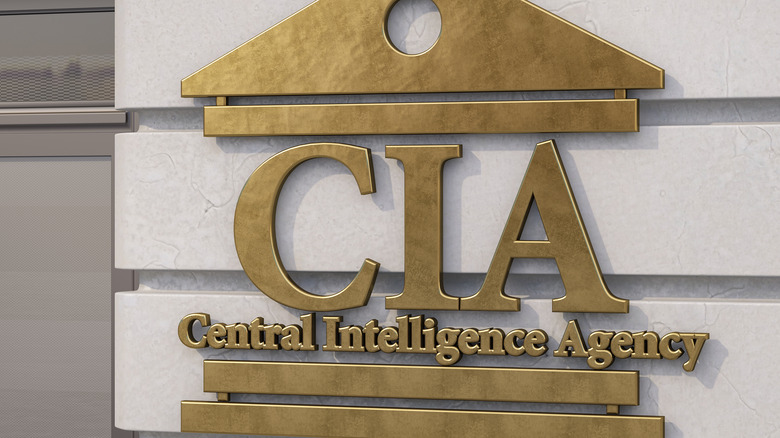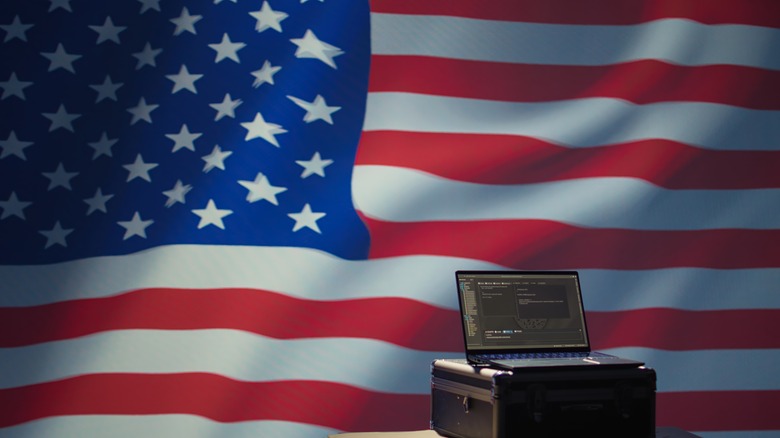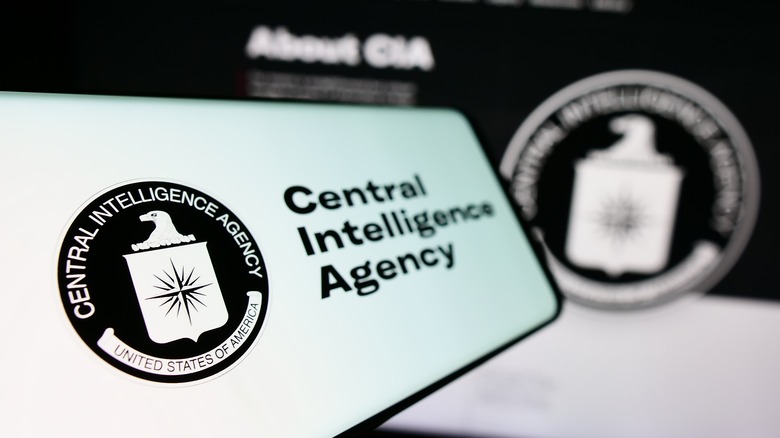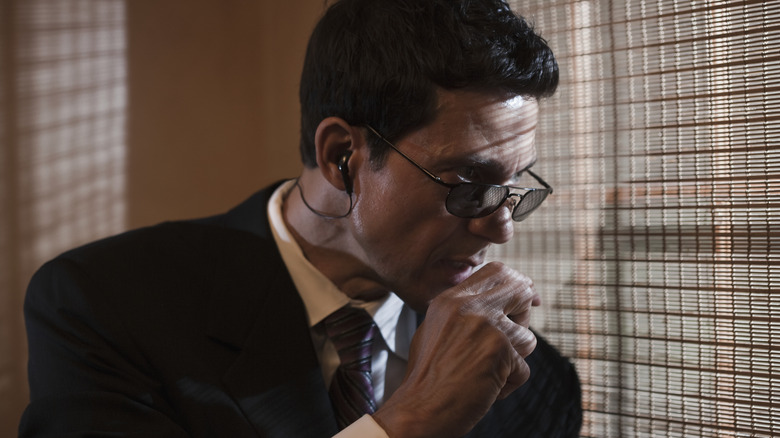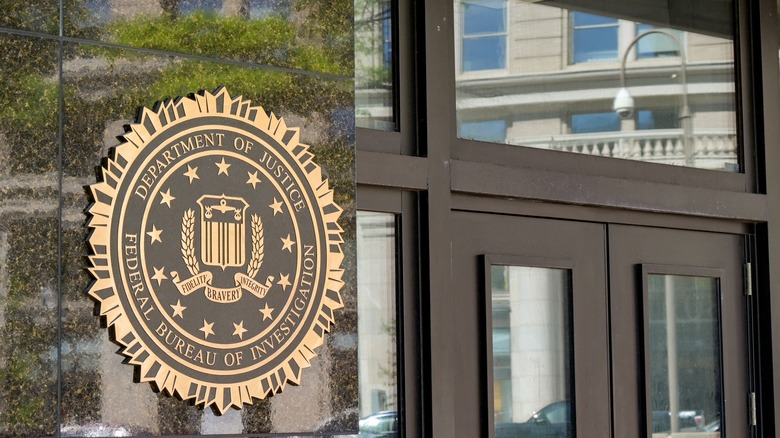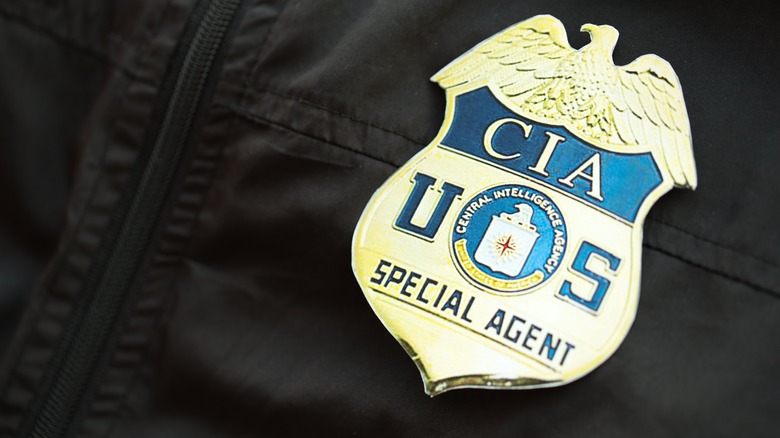Strict Rules CIA Agents Have To Follow
Around 50,000 people apply to work for the Central Intelligence Agency in any given year. The United States' premiere intelligence-gathering organization has exacting standards for its potential employees, regardless of the job they're taking on. That strict scrutiny doesn't end once the applicant gets the gig, either. CIA employees must follow a series of strict rules and regulations enacted by the highest government offices in the United States, and those orders have to be followed both on and off the job.
However, CIA rules are not easy to document in their entirety, and the Federal Register maintains only 32 documents on the subject of CIA regulations and policy changes. Part of the reason it's so hard to gather information on the CIA's internal actions is that, unsurprisingly, a lot of the material remains classified and doesn't become public knowledge until FOIA requests reveal them decades later. In fact, a lot of the published rules merely govern the process of declassifying other documents, so finding the actual day-to-day rules that govern any given agent's operations is not an easy task. Spies are notoriously slippery people, and working in a clandestine field, many of the strict regulations every CIA officer — the agency's official name for what many think of as agents — must follow are kept away from the public eye. Nonetheless, here are some of those rules.
CIA agents must swear loyalty to the United States and always abide by it
CIA officers must demonstrate and maintain absolute allegiance to the United States of America. It should be fairly obvious why the United States would need its secret agents to uphold loyalty, but the past of the CIA is inexorably tied to the history of how loyalty oaths were laid out in U.S. policy. President Harry S. Truman signed the National Security Act into law in 1947, establishing the CIA. The same year, he also signed Executive Order 9835, creating a loyalty program for federal employees. Truman's order required the head of each agency in the government's executive branch to organize a loyalty board to root out and dispense with anyone who didn't toe the line.
Today, the CIA lists unwavering loyalty to the United States among its list of non-negotiable qualifications for a job in the agency. It's also the most common element of the job employees hear every day. In a piece for The Atlantic, former CIA analyst Aki Peritz addresses then-CIA Director John Brennan's leaked "Honor the Oath" policy. Brennan sought to reinforce the dire consequences awaiting any employee who leaked classified material in the wake of Edward Snowden. Practically every element of the job reminds employees of the potential risks, to the point of creating a culture of paranoia around security violations. Peritz even suggested that Brennan's focus on a few violators unfairly ignored the good work of many CIA officers who remained loyal.
CIA agents must swear an oath of secrecy
CIA officers must take several oaths when they join the nation's premiere intelligence organization. The Oath of Office requires those who take it to zealously defend the Constitution of the United States from all enemies, foreign and domestic. Most government officials take that constitutional pledge, but those concerned with intelligence also take an Oath of Secrecy. The first Oath of Secrecy policy entered the CIA in 1953, only six years after President Truman signed the National Security Act that created the institution.
The pledge's wording has changed significantly since then, but the spirit of the original secrecy agreement remains intact, and the CIA published a more modern iteration of the oath in 2002. The Oath of Secrecy requires CIA agents to swear never to discuss or divulge any classified "Communications Intelligence" or any source from which they retrieved it. It goes on to stipulate that no change in employment will ever free the agent from the oath, guaranteeing a lifetime of legally actionable silence. In its final paragraph, the document states that violators of any related statute could face criminal penalties.
Every agent must agree to these terms and uphold them stringently. The Oath of Secrecy insists on its importance before listing the terms to which the reader agrees.
Social media use by CIA agents is tightly controlled
CIA officers are not barred from using social media, but there are rules on how they should use them. The CIA's official careers website considered social media such a hot topic that it made "You can't use social media if you work for the CIA" the second of 12 myths they sought to dispel. That might suggest that agents can use social media like anyone else, but that's not true, either. Not only are agents prohibited from using social media while at work, they cannot mention or even follow the CIA in their postings.
This can be a minefield for new recruits, many of whom may have grown up surrounded by social media. In a 2015 interview with CNN Business, CIA hiring chief Ron Patrick shed some light on how the CIA approaches its agents' online habits, and why. For starters, posting about a successful interview is a quick and easy way to undo all the progress an applicant has made. Potential agents are asked to avoid engaging with official accounts, but on the other hand, newcomers shouldn't immediately cease posting. Staying engaged can reveal too much, but disappearing suddenly also rouses suspicion.
Violating these guidelines can cost some potential and even active agents the opportunity to work for the CIA. If applicants do get the job, Patrick also warns against tagging coworkers or dropping locations. Even maintaining a friend list of fellow CIA officers can be a problem.
The Langley Starbucks can't take names from CIA agent customers
The CIA's headquarters is the George Bush Center for Intelligence in Langley, Virginia. While the campus does not offer tours to the public, we do know some eye-opening details of at least one area: the on-site Starbucks. The Langley coffee shop might be the most well-guarded Starbucks in the United States, and potential employees undergo several background checks before they can take the job. While plenty of regulations govern the baristas, the CIA officers who use the Starbucks also can't just merrily order their coffee with abandon.
Agents are barred from offering any identifying information to the baristas at the Langley Starbucks, which can prove a logistical nightmare when no names can be written on the cups. Indeed, ex-CIA operative Tracy Walder told Spyscape's podcast "True Spies," "Even a random number could be linked to your true identity." Instead, officers have to keep all details completely hidden, avoiding even the most distant possible connection. The CIA's Starbucks also eschews the typical frequent customer card system, as the list could fall into the wrong hands and compromise countless employees. Intriguingly, CIA officers are known to use Starbucks gift cards to communicate with their human assets.
CIA agents cannot use U.S. human assets
Contrary to what many may think, employees of the CIA are not called agents. Instead, that term refers to foreign nationals who offer intelligence on their home country, whereas the proper term for a CIA employee is "officer." The work of preparing, engaging, and consistently drawing information from an agent belongs to a case officer, who follows several guidelines and a few hard rules to guarantee the successful gathering of useful intelligence.
Spyscape spoke to former case officer Ryan Hillsberg about the process of developing a foreign agent. Hillsberg firmly establishes that case officers are forbidden from gathering agents or assets from United States corporations. Instead, he claimed to target foreign industries that held potentially harmful data. Hillsberg notes people skills as the most important skill a case officer can bring to the table. It is critical that handlers and agents meet unobserved before they begin swapping information. Case officers often make deals with their assets, paying or manipulating the potential assets for intelligence. Hillsberg also notes the importance of leaving former assets on amicable terms, even in cases that end in firing. Assets are a critical part of the CIA's network, forcing case officers to abide by tried-and-true methods.
CIA agents have a strict protocol when contacting the FBI
The FBI and the CIA have a long history of competition and disagreements. Though both are members of the United States' intelligence infrastructure, the FBI exists as a law-enforcement organization, while the CIA is solely devoted to gathering information. The real difference between the CIA and the FBI governs their jurisdiction. The CIA is strictly forbidden from using its resources to spy on U.S. citizens, leaving the FBI to handle any domestic intelligence tasks. This explicit restriction against gathering intelligence on Americans can sometimes come into conflict with CIA tasks. In some cases, the CIA's only recourse is to reach out to the FBI, and there is a strict framework for doing so.
Generally, the two agencies are free to work together toward specific shared goals, but the consistent restriction on the CIA's interactions with U.S. persons requires the CIA to reach out. The CIA may also need to request the FBI's police powers in matters such as filing subpoenas. There are a series of specific steps the CIA must take to enlist the FBI, including a list of instructions for crafting a formal request for collection assistance. The proposing person has to enumerate the reasons the FBI should handle the gig, the purpose of the activity, and the shared strategy for accomplishing the mission. The director of the CIA or a designee then needs to submit this request to the FBI.
The CIA gift shop is off-limits to covert CIA agents
In addition to a Starbucks, employees of the CIA have another small bubble of ordinary in their extraordinarily secretive and isolated workplace: a gift shop, where multiple pieces of branded merchandise are sold, including luggage bearing the CIA logo. However, not everyone is allowed to swing by and pick up a postcard or bag of novelty candy. Covert CIA officers are forbidden from accessing the gift shop at the agency's Virginia headquarters. And given that most of the available products proudly feature the logo of the notoriously secretive organization, any agency officers just can't purchase most of the items on sale.
In 2019, Langley gift shop's executive director, Mark Wiggins, discussed the shop's extremely limited consumer base with The Washington Post. According to Wiggins, only CIA employees, vetted visitors, and employee family members can use the shop. In addition, not all of the products are branded, with a selection of items like hot sauce, fudge, and stamps, but officers tend to avoid the branded swag. However, most of the branded items apparently fly off the shelf on the shop's annual Family Day.
CIA agents cannot act on crimes being committed by U.S. citizens
The CIA is not a law-enforcement organization, and the CIA is highly restricted in its use of resources to spy on American citizens or businesses. Furthermore, no identifying information gathered by the CIA that is related to U.S. persons can be disseminated beyond the intelligence community. This critical restriction can come up against the fact that the agency will sometimes acquire identifying information about Americans in the course of their efforts. In such an event, there is a process that CIA agents must use to report violations of U.S. federal law.
The CIA must report any evidence of federal crimes involving U.S. citizens to the Department of Justice. The CIA can "incidentally" capture evidence of potential violations, but the lack of law-enforcement power prevents them from taking action. If they spot a crime by an American citizen, they have to turn that information over to the DOJ. Per the CIA, the example that the attorney general's office uses involves a U.S. citizen trafficking weapons or technology to a hostile foreign government. The CIA is obliged to use the least invasive methods of gathering intelligence whenever they interact with U.S. persons, but they still have a duty to report anything they stumble upon.
The use of deep cover operatives by CIA agents must have a clearly defined objective
Most intelligence operatives work under what is called "legal" cover, infiltrating a target nation by operating as an agent of their own government, such as a U.S. diplomat or a member of an embassy's staff. But some of the spy world's most devious officers – and the spies we associate with devious disguises — live as civilians or otherwise trusted staff privy to potential intelligence. This undercover spycraft is bread and butter for the CIA, but even with its decades of experience, there is one general rule for placing spies undercover: Don't send a spy into deep cover to do a job that a regular officer can do from a safer position, and make sure the objective is clear.
In 1961, the paper "Principles of Deep Cover" was secretly published in the CIA's journal Studies in Intelligence. In addition to covering the many guidelines and best practices for officers working under assumed identities, it had some wise words for those who would assign officers to dangerous undercover missions, rather than for the spies themselves. In particular, it states: "... intelligence objective should be established before the steps are taken that commit the service to the operation." In other words, the CIA employees who plan deep cover operations have to perfectly fit their officers to their new identities in pursuit of a well-selected intelligence goal.
The paper cites a violation of this rule in the form of an agent who sought a deep cover assignment without a specific goal in mind. The officer spent four years attending a university undercover, then established himself as a salesman in the region. After four years of operating as a deep cover operative, he provided no useful information. Eventually, he "lost interest in the intelligence objective and resigned."
CIA agents are discouraged from marrying foreigners
As recently as 2010, the CIA's career website reportedly specified that covert operatives and their spouses must be U.S. citizens. Though it has been claimed that foreign national spouses of covert CIA agents are acceptable if they are on track to be naturalized within five years, a 2007 report by the Department of Defense notes "divided loyalties" as a common problem for American spies, and the CIA has a long history of regulating or banning officers marrying non-American citizens.
CIA officers are no strangers to talk of aliens, but old documents use the term for foreign nationals. A 1954 memo from the acting deputy director of the CIA states that it is the duty of any employee planning to marry an "alien" to seek approval or risk their position. The memo goes on to specify that the director insists on personally approving the security clearance of every employee in such a marriage.
An unsigned 1976 memo addresses the "alien marriage" issue again. The author cites potential issues with retention that may arise from firing agents who might choose their spouse over their job. The author also notes that "the general feeling is that the female employee's request is turned down in a much higher percentage than those of the male employees." It's one of many cases of women facing discrimination in the CIA. The following year, another memo from Deputy Director for Administration, John F. Blank, cited "unusual abilities or potential" as justifiable reasons for the retention of an officer married to a foreigner.
CIA agents have strict rules when on agency installations
CIA officers have a full list of rules that govern their behavior on agency installations, which includes any property that the CIA owns, leases, or controls, as well as any property under the Office of the Director of National Intelligence. While most of the rules on agency installations are similar to those in the rest of America, there are some restrictions that stand out, such as the prohibition of weapons with few exceptions.
Only a person with explicit authorization from the CIA director of security can carry or use a weapon on an agency installation. Government agents in the act of enforcing laws can carry weapons, but all other employees are restricted. However, in 2023, an exception was made for "irritant gas," such as mace or pepper spray. Cameras and recording equipment were similarly regulated. Only permission from the CIA director can allow a CIA employee or visitor to carry a gun or a camera on an agency installation. Even handing out pamphlets on agency property is a violation without the CIA director's acceptance.
